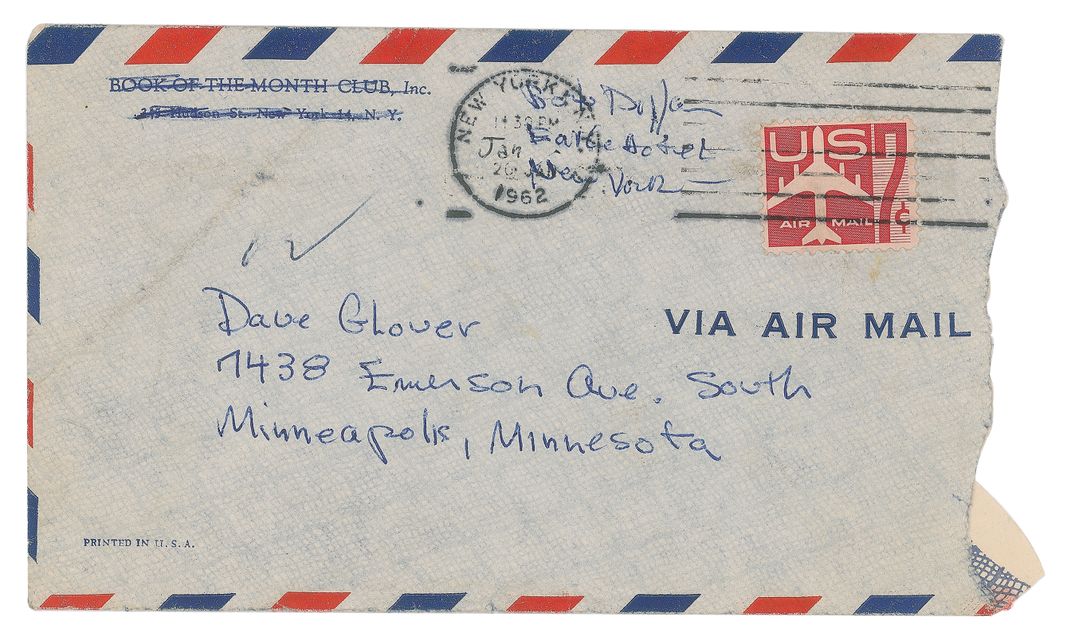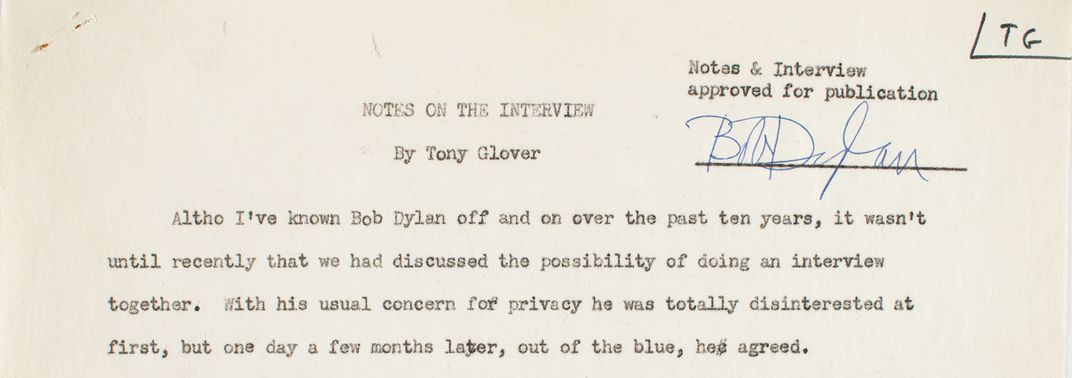Long-Hidden Trove of Bob Dylan Letters, Handwritten Lyrics Heads to Auction
The archives of harmonica player and close Dylan friend Tony Glover act as a “time capsule” of 20th-century music, says RR Auction
:focal(878x664:879x665)/https://tf-cmsv2-smithsonianmag-media.s3.amazonaws.com/filer/43/ae/43ae46e5-d220-45ad-bb3f-1d23710e2393/screen_shot_2020-11-20_at_104827_am.png)
Bob Dylan needs no introduction. The 2016 Nobel Prize winner in literature is often lauded as “the voice of his generation”; for more than 50 years, his music has captivated audiences with powerful statements about changing times, cryptic stories populated by archetypes and incisive reflections on watershed moments in United States history.
A veritable treasure trove of memorabilia related to the musician—including Dylan’s personal correspondence, interview tapes, posters and photographs—went up for sale at RR Auction this month. Per a statement from the Boston-based auction house, Tony Glover, a renowned harmonica player, music journalist and close friend of Dylan, acquired the “impressive variety of ephemera and artifacts” over several decades. Glover’s widow offered the collection to RR Auction following her husband’s death last year.
The items in Glover’s archives offer unique insights into Dylan’s personal life. As Lauren Daley reports for the Boston Globe, a major highlight is an annotated interview transcript prepared by the pair for an Esquire magazine feature. Never actually published, the 1971 document finds Dylan answering Glover’s questions about his relationships with friends and family.
At first, the “Blowin’ in the Wind” singer responds to a question about his secret marriage by saying, “I didn’t keep it a secret, I just didn’t find it—I just didn’t think anybody needed to know that.” Reviewing a typed transcript of the interview later, however, Dylan revised his statement in blue ink, replacing it with a witty one-liner: “My wife knew.”
Bobby Livingston, executive vice president of RR Auction, tells the Globe that the interview transcripts and tapes weren’t previously “known to exist. [Glover] never shared this with anyone.”
Other items in the collection belonged to Dylan’s contemporaries. Notable offerings included a book of poetry signed by the Doors’ Jim Morrison (sold for $23,353.75), a shirt worn onstage by Bob Marley (sold for $33,275), and a signed letter from John Lennon and Yoko Ono (sold for $31,251.25). According to Atlas Obscura’s Matthew Taub, the auction also featured objects linked to literary and musical luminaries like Jack Kerouac, Patti Smith and former Dylan girlfriend Joan Baez.
“He didn’t collect all this stuff to capitalize on it,” Glover’s neighbor and friend, Pete Lee, tells the Star Tribune’s Chris Riemenschneider. “He did it because that’s who he was: a rabid collector.”
Dylan and Glover became friends in the 1960s, when the former was playing folk and blues music in Minneapolis clubs, writes Douglas Brinkley for Rolling Stone.
“I couldn’t play like Glover or anything, and didn’t try to. I played mostly like Woody Guthrie, and that was about it,” Dylan recalled in his 2004 memoir, Chronicles. “Glover’s playing was known and talked about around town, but nobody commented on mine.”
To put it mildly, people certainly started noticing Dylan’s music once he left Minneapolis for New York. Though Glover remained in Minnesota, he and Dylan maintained a decades-long friendship, exchanging a lengthy series of correspondence now included in the sale.
/https://tf-cmsv2-smithsonianmag-media.s3.amazonaws.com/filer/3f/e9/3fe90c5e-845e-4bfb-a706-933795f5acf1/screen_shot_2020-11-20_at_105030_am.png)
“I can probably count on one hand the number of times we’ve gotten together socially, where it wasn’t related to a gig or something work-related,” Glover recalled in comments later quoted by the Star Tribune.
The upside, he added, “is that when we do get together, it’s always fun. That may be part of our chemistry.”
After Glover died at age 79 in May 2019, his widow, Cynthia Nadler, found his collection in their St. Paul home. Though she initially deemed the items “junk,” Nadler soon realized the trove’s significance. As she tells the Star Tribune, “I’m learning to call it ‘archival materials,’ instead.’”
Perhaps Dylan’s handwritten notes and interview transcripts will reveal more details about his fascinating life and writing process. Music lovers and literary figures have long praised his work, and his songs continue to resonate with audiences today—a fact reflected by his controversial 2016 Nobel Prize in Literature. Reading through Dylan's forgotten remarks could offer both archivists and fans an explanation for some of his most famous lyrics.
“The collection is a time capsule,” Livingston says to the Boston Globe. “Tony Glover crossed paths with most major musical figures of the 20th century.”
/https://tf-cmsv2-smithsonianmag-media.s3.amazonaws.com/accounts/headshot/Isis_Davis-Marks_thumbnail.png)
/https://tf-cmsv2-smithsonianmag-media.s3.amazonaws.com/filer/6b/78/6b785eac-99e4-4baf-b84b-05ea9a930070/3436277_3.jpg)


/https://tf-cmsv2-smithsonianmag-media.s3.amazonaws.com/accounts/headshot/Isis_Davis-Marks_thumbnail.png)